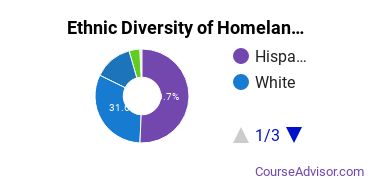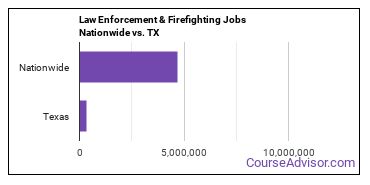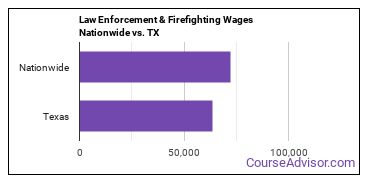Homeland Security, Law Enforcement & Firefighting Schools in Texas
In 2022-2023, 10,472 students earned their Homeland Security, Law Enforcement & Firefighting degrees in TX.
A Homeland Security, Law Enforcement & Firefighting major is the 12th most popular major in this state.
Education Levels of Homeland Security, Law Enforcement & Firefighting Majors in Texas
Homeland Security, Law Enforcement & Firefighting majors in the state tend to have the following degree levels:
| Education Level | Number of Grads |
|---|---|
| Bachelor’s Degree | 4,853 |
| Associate Degree | 2,141 |
| Award Taking Less Than 1 Year | 2,006 |
| Master’s Degree | 778 |
| Award Taking 1 to 2 Years | 590 |
| Award Taking 2 to 4 Years | 590 |
| Post-Master’s Certificate | 82 |
| Postbaccalaureate Certificate | 82 |
| Doctor’s Degree (Research / Scholarship) | 22 |
| Doctor’s Degree (Professional Practice) | 22 |
| Doctor’s Degree (Other) | 22 |
Gender Distribution
In Texas, a homeland security, law enforcement & firefighting major is more popular with women than with men.

Racial Distribution
The racial distribution of homeland security, law enforcement & firefighting majors in Texas is as follows:
- Asian: 1.8%
- Black or African American: 12.5%
- Hispanic or Latino: 50.4%
- White: 30.3%
- Non-Resident Alien: 0.5%
- Other Races: 4.4%

Jobs for Homeland Security, Law Enforcement & Firefighting Grads in Texas
In this state, there are 328,990 people employed in jobs related to a homeland security, law enforcement & firefighting degree, compared to 4,690,450 nationwide.

Wages for Homeland Security, Law Enforcement & Firefighting Jobs in Texas
A typical salary for a homeland security, law enforcement & firefighting grad in the state is $63,470, compared to a typical salary of $72,390 nationwide.

Most Popular Homeland Security, Law Enforcement & Firefighting Programs in TX
There are 10 colleges in Texas that offer homeland security, law enforcement & firefighting degrees. Learn about the most popular 10 below:
Most students complete their degree in 4.49 years. Students enjoy a student to faculty ratio of 20 to 1. Students who attend this public school pay an average net price of $15,134.
Request InformationMost students complete their degree in 4.70 years. 19 to 1 is the student to faculty ratio. This public school has an average net price of $7,007.
Request InformationThe full-time teacher rate is 74%. This public college charges it's students an average net price of $14,840. 21 to 1 is the student to faculty ratio.
Request InformationThe student to faculty ratio is 23 to 1. A typical student attending UNT will pay a net price of $15,205. Of all the students who attend this school, 95% get financial aid.
Request InformationThe average student takes 4.61 years to complete their degree at UTSA. Of all the teachers who work at the school, 76% are considered full time. Students who attend this public school pay an average net price of $12,911.
Request InformationA typical student attending South Texas College will pay a net price of $1,522. 56% of the teachers are full time. 99% of students are awarded financial aid at this school.
Request Information19 to 1 is the student to faculty ratio. 69% of the teachers are full time. 91% of students are awarded financial aid at this school.
Request InformationStudents who attend this public school pay an average net price of $4,725. Of all the teachers who work at the school, 48% are considered full time. Seeking financial aid? At this school, 92% of students receive it.
Request InformationStudents enjoy a student to faculty ratio of 18 to 1. 50% of the teachers are full time. A typical student attending UH Downtown will pay a net price of $14,797.
Request InformationIt takes the average student 4.59 years to graduate. 19 to 1 is the student to faculty ratio. The full-time teacher rate is 58%.
Request InformationHomeland Security, Law Enforcement & Firefighting Careers in TX
Some of the careers homeland security, law enforcement & firefighting majors go into include:
| Job Title | TX Job Growth | TX Median Salary |
|---|---|---|
| Financial Examiners | 20% | $75,710 |
| Fire Inspectors | 17% | $67,950 |
| Firefighters | 17% | $51,240 |
Related Majors in Texas
Below are some popular majors in the state that are similar to homeland security, law enforcement & firefighting.
| Major | Annual Graduates in TX |
|---|---|
| Legal Professions | 3,012 |
View all majors related to Homeland Security, Law Enforcement & Firefighting
Explore Major by State
Alabama
Arkansas
Connecticut
Florida
Idaho
Iowa
Louisiana
Massachusetts
Mississippi
Nebraska
New Jersey
North Carolina
Oklahoma
Rhode Island
Tennessee
Vermont
West Virginia
View Nationwide Homeland Security, Law Enforcement & Firefighting Report
References
- College Factual
- National Center for Education Statistics
- O*NET Online
- Image Credit: By Barry Bahler under License
More about our data sources and methodologies.








